Heidi v Fast Pty Ltd: ACL Rights and Remedies
VerifiedAdded on 2020/10/23
|9
|2276
|92
AI Summary
The assignment discusses Heidi's experience with Fast Pty Ltd, who failed to provide a new machine or repair it promptly, resulting in a week-long closure of her business. The Australian Consumer Law (ACL) provides rights to consumers, including the right to reject products, request repairs or replacements, and sue for damages. Heidi can exercise these rights by providing evidence, such as invoices or bank statements, and seeking compensation for her losses.
Contribute Materials
Your contribution can guide someone’s learning journey. Share your
documents today.
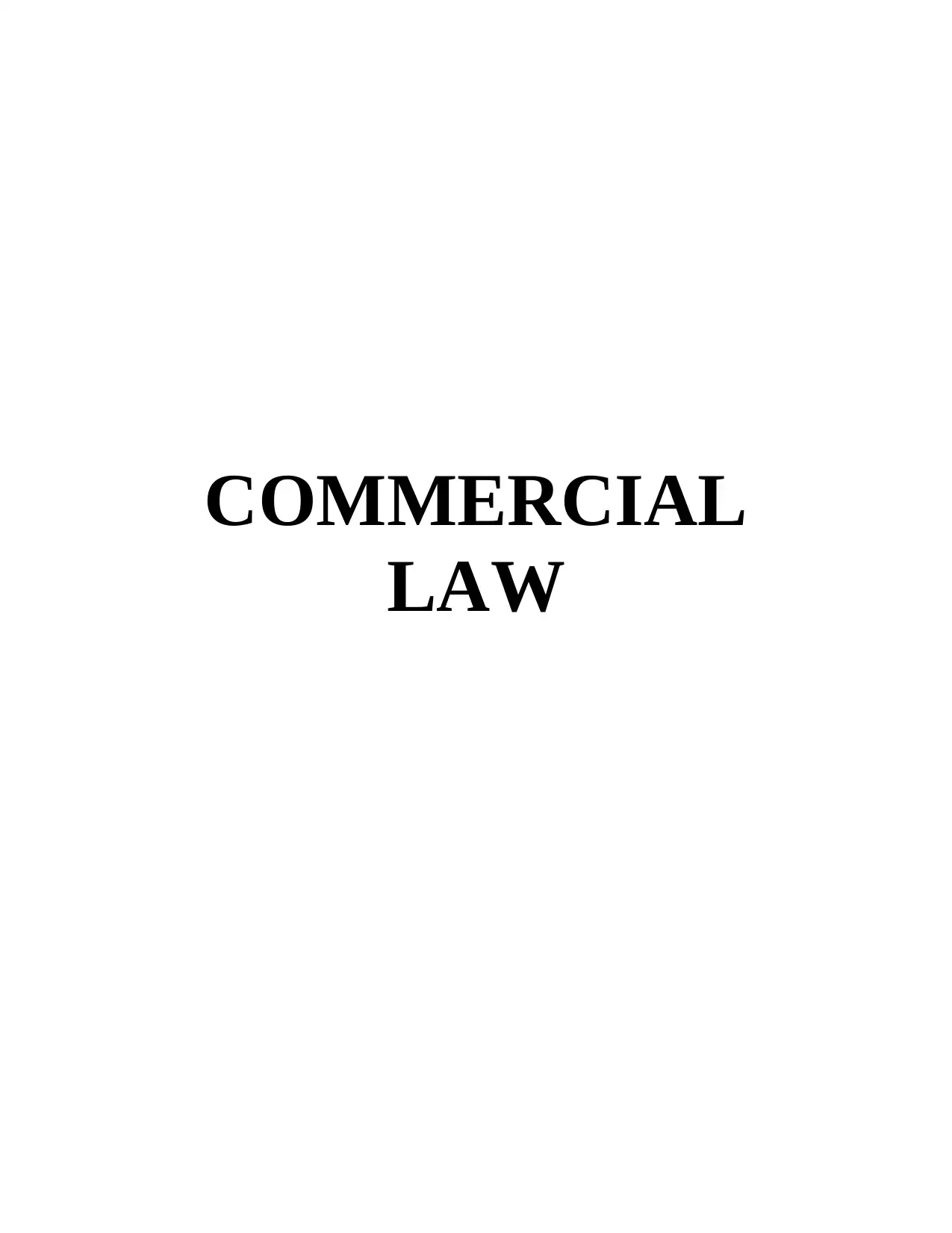
COMMERCIAL
LAW
LAW
Secure Best Marks with AI Grader
Need help grading? Try our AI Grader for instant feedback on your assignments.
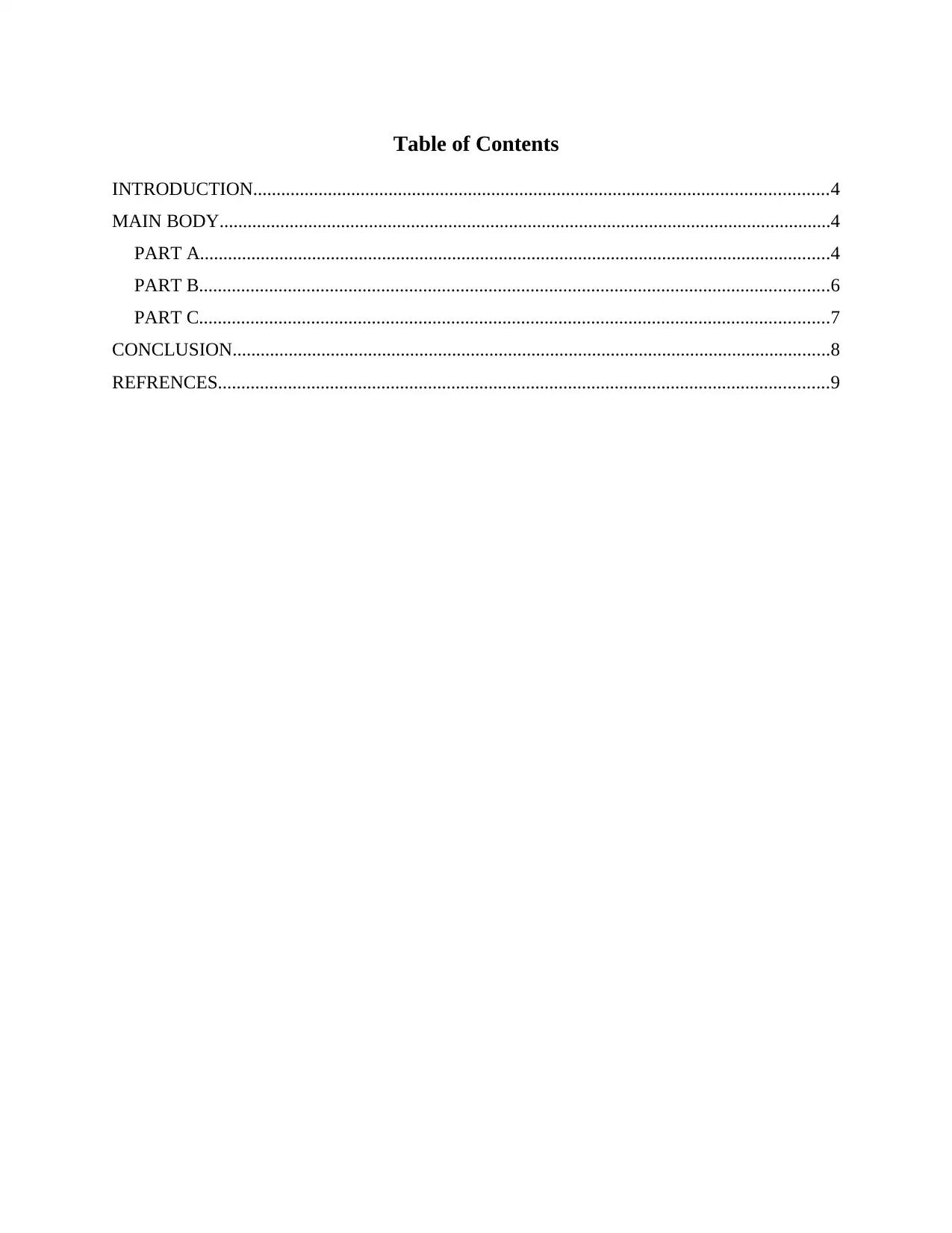
Table of Contents
INTRODUCTION...........................................................................................................................4
MAIN BODY...................................................................................................................................4
PART A.......................................................................................................................................4
PART B.......................................................................................................................................6
PART C.......................................................................................................................................7
CONCLUSION................................................................................................................................8
REFRENCES...................................................................................................................................9
INTRODUCTION...........................................................................................................................4
MAIN BODY...................................................................................................................................4
PART A.......................................................................................................................................4
PART B.......................................................................................................................................6
PART C.......................................................................................................................................7
CONCLUSION................................................................................................................................8
REFRENCES...................................................................................................................................9
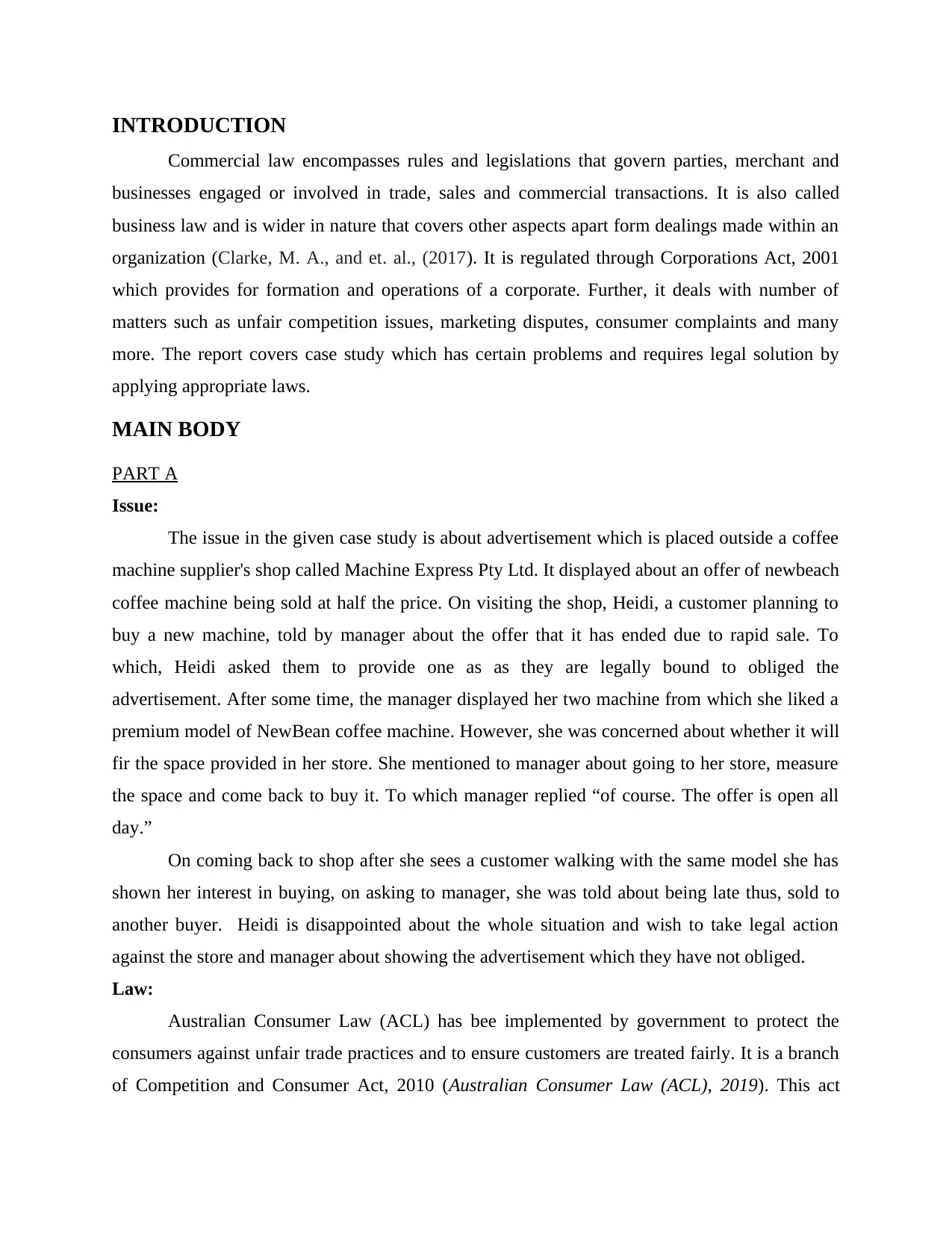
INTRODUCTION
Commercial law encompasses rules and legislations that govern parties, merchant and
businesses engaged or involved in trade, sales and commercial transactions. It is also called
business law and is wider in nature that covers other aspects apart form dealings made within an
organization (Clarke, M. A., and et. al., (2017). It is regulated through Corporations Act, 2001
which provides for formation and operations of a corporate. Further, it deals with number of
matters such as unfair competition issues, marketing disputes, consumer complaints and many
more. The report covers case study which has certain problems and requires legal solution by
applying appropriate laws.
MAIN BODY
PART A
Issue:
The issue in the given case study is about advertisement which is placed outside a coffee
machine supplier's shop called Machine Express Pty Ltd. It displayed about an offer of newbeach
coffee machine being sold at half the price. On visiting the shop, Heidi, a customer planning to
buy a new machine, told by manager about the offer that it has ended due to rapid sale. To
which, Heidi asked them to provide one as as they are legally bound to obliged the
advertisement. After some time, the manager displayed her two machine from which she liked a
premium model of NewBean coffee machine. However, she was concerned about whether it will
fir the space provided in her store. She mentioned to manager about going to her store, measure
the space and come back to buy it. To which manager replied “of course. The offer is open all
day.”
On coming back to shop after she sees a customer walking with the same model she has
shown her interest in buying, on asking to manager, she was told about being late thus, sold to
another buyer. Heidi is disappointed about the whole situation and wish to take legal action
against the store and manager about showing the advertisement which they have not obliged.
Law:
Australian Consumer Law (ACL) has bee implemented by government to protect the
consumers against unfair trade practices and to ensure customers are treated fairly. It is a branch
of Competition and Consumer Act, 2010 (Australian Consumer Law (ACL), 2019). This act
Commercial law encompasses rules and legislations that govern parties, merchant and
businesses engaged or involved in trade, sales and commercial transactions. It is also called
business law and is wider in nature that covers other aspects apart form dealings made within an
organization (Clarke, M. A., and et. al., (2017). It is regulated through Corporations Act, 2001
which provides for formation and operations of a corporate. Further, it deals with number of
matters such as unfair competition issues, marketing disputes, consumer complaints and many
more. The report covers case study which has certain problems and requires legal solution by
applying appropriate laws.
MAIN BODY
PART A
Issue:
The issue in the given case study is about advertisement which is placed outside a coffee
machine supplier's shop called Machine Express Pty Ltd. It displayed about an offer of newbeach
coffee machine being sold at half the price. On visiting the shop, Heidi, a customer planning to
buy a new machine, told by manager about the offer that it has ended due to rapid sale. To
which, Heidi asked them to provide one as as they are legally bound to obliged the
advertisement. After some time, the manager displayed her two machine from which she liked a
premium model of NewBean coffee machine. However, she was concerned about whether it will
fir the space provided in her store. She mentioned to manager about going to her store, measure
the space and come back to buy it. To which manager replied “of course. The offer is open all
day.”
On coming back to shop after she sees a customer walking with the same model she has
shown her interest in buying, on asking to manager, she was told about being late thus, sold to
another buyer. Heidi is disappointed about the whole situation and wish to take legal action
against the store and manager about showing the advertisement which they have not obliged.
Law:
Australian Consumer Law (ACL) has bee implemented by government to protect the
consumers against unfair trade practices and to ensure customers are treated fairly. It is a branch
of Competition and Consumer Act, 2010 (Australian Consumer Law (ACL), 2019). This act
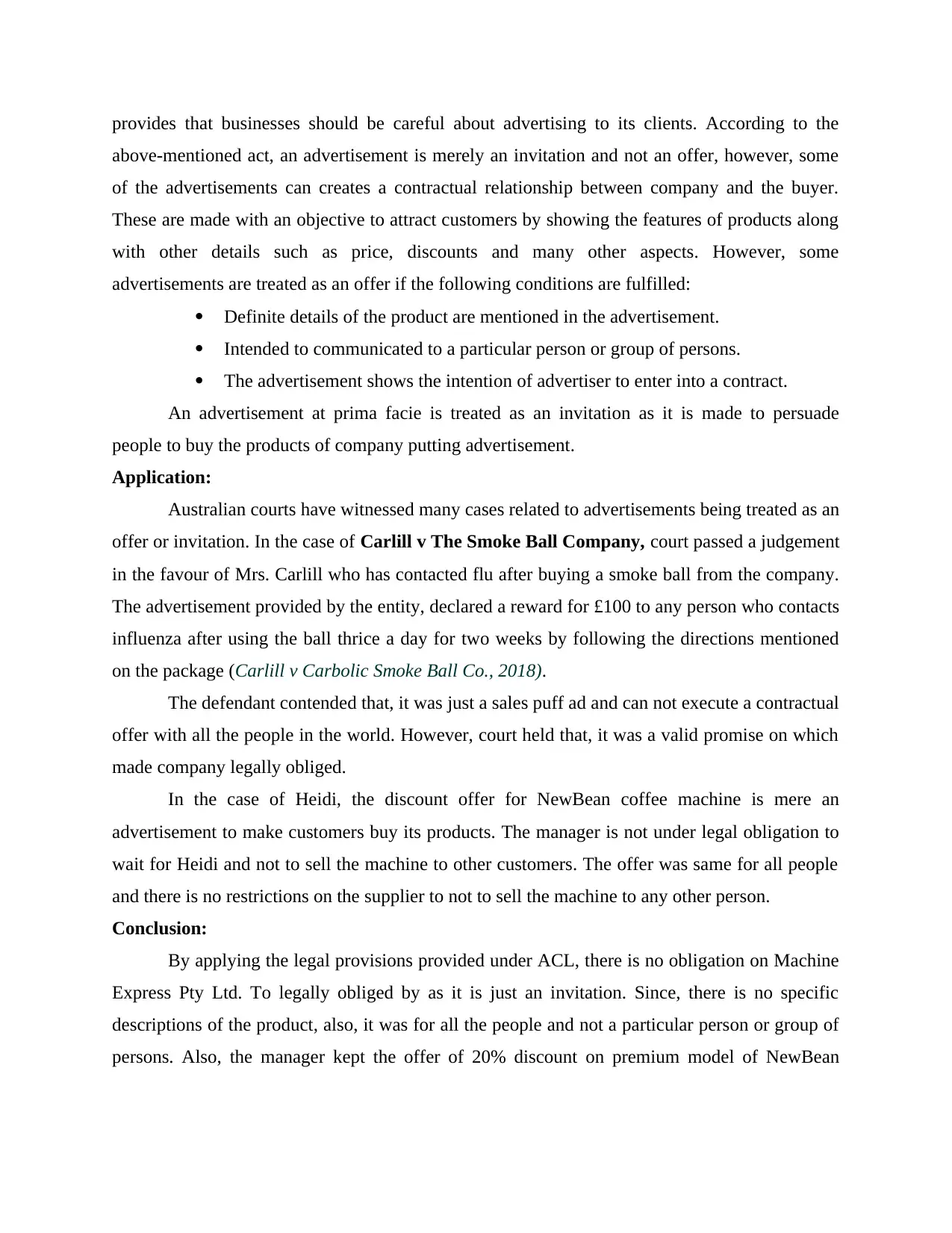
provides that businesses should be careful about advertising to its clients. According to the
above-mentioned act, an advertisement is merely an invitation and not an offer, however, some
of the advertisements can creates a contractual relationship between company and the buyer.
These are made with an objective to attract customers by showing the features of products along
with other details such as price, discounts and many other aspects. However, some
advertisements are treated as an offer if the following conditions are fulfilled:
Definite details of the product are mentioned in the advertisement.
Intended to communicated to a particular person or group of persons.
The advertisement shows the intention of advertiser to enter into a contract.
An advertisement at prima facie is treated as an invitation as it is made to persuade
people to buy the products of company putting advertisement.
Application:
Australian courts have witnessed many cases related to advertisements being treated as an
offer or invitation. In the case of Carlill v The Smoke Ball Company, court passed a judgement
in the favour of Mrs. Carlill who has contacted flu after buying a smoke ball from the company.
The advertisement provided by the entity, declared a reward for £100 to any person who contacts
influenza after using the ball thrice a day for two weeks by following the directions mentioned
on the package (Carlill v Carbolic Smoke Ball Co., 2018).
The defendant contended that, it was just a sales puff ad and can not execute a contractual
offer with all the people in the world. However, court held that, it was a valid promise on which
made company legally obliged.
In the case of Heidi, the discount offer for NewBean coffee machine is mere an
advertisement to make customers buy its products. The manager is not under legal obligation to
wait for Heidi and not to sell the machine to other customers. The offer was same for all people
and there is no restrictions on the supplier to not to sell the machine to any other person.
Conclusion:
By applying the legal provisions provided under ACL, there is no obligation on Machine
Express Pty Ltd. To legally obliged by as it is just an invitation. Since, there is no specific
descriptions of the product, also, it was for all the people and not a particular person or group of
persons. Also, the manager kept the offer of 20% discount on premium model of NewBean
above-mentioned act, an advertisement is merely an invitation and not an offer, however, some
of the advertisements can creates a contractual relationship between company and the buyer.
These are made with an objective to attract customers by showing the features of products along
with other details such as price, discounts and many other aspects. However, some
advertisements are treated as an offer if the following conditions are fulfilled:
Definite details of the product are mentioned in the advertisement.
Intended to communicated to a particular person or group of persons.
The advertisement shows the intention of advertiser to enter into a contract.
An advertisement at prima facie is treated as an invitation as it is made to persuade
people to buy the products of company putting advertisement.
Application:
Australian courts have witnessed many cases related to advertisements being treated as an
offer or invitation. In the case of Carlill v The Smoke Ball Company, court passed a judgement
in the favour of Mrs. Carlill who has contacted flu after buying a smoke ball from the company.
The advertisement provided by the entity, declared a reward for £100 to any person who contacts
influenza after using the ball thrice a day for two weeks by following the directions mentioned
on the package (Carlill v Carbolic Smoke Ball Co., 2018).
The defendant contended that, it was just a sales puff ad and can not execute a contractual
offer with all the people in the world. However, court held that, it was a valid promise on which
made company legally obliged.
In the case of Heidi, the discount offer for NewBean coffee machine is mere an
advertisement to make customers buy its products. The manager is not under legal obligation to
wait for Heidi and not to sell the machine to other customers. The offer was same for all people
and there is no restrictions on the supplier to not to sell the machine to any other person.
Conclusion:
By applying the legal provisions provided under ACL, there is no obligation on Machine
Express Pty Ltd. To legally obliged by as it is just an invitation. Since, there is no specific
descriptions of the product, also, it was for all the people and not a particular person or group of
persons. Also, the manager kept the offer of 20% discount on premium model of NewBean
Secure Best Marks with AI Grader
Need help grading? Try our AI Grader for instant feedback on your assignments.
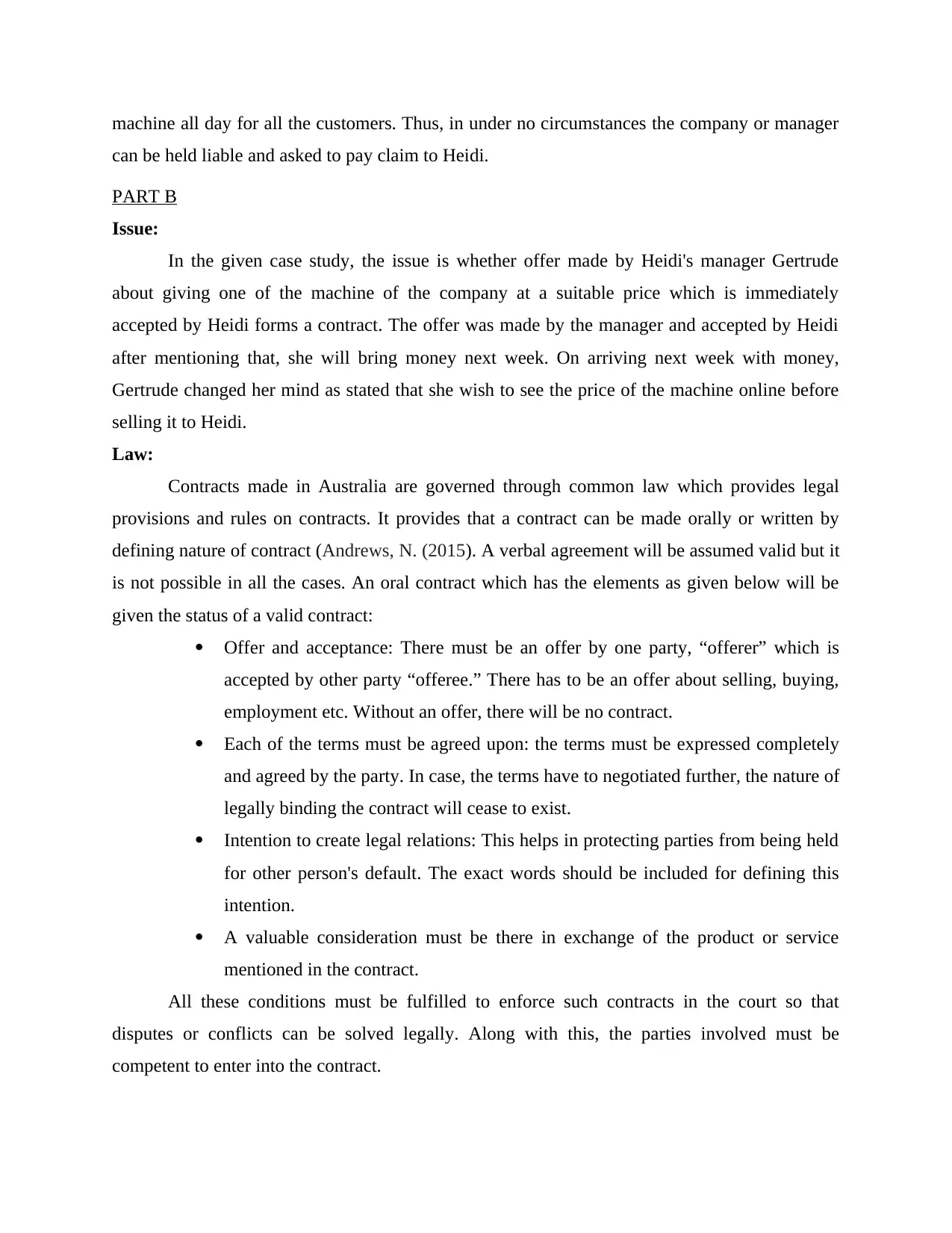
machine all day for all the customers. Thus, in under no circumstances the company or manager
can be held liable and asked to pay claim to Heidi.
PART B
Issue:
In the given case study, the issue is whether offer made by Heidi's manager Gertrude
about giving one of the machine of the company at a suitable price which is immediately
accepted by Heidi forms a contract. The offer was made by the manager and accepted by Heidi
after mentioning that, she will bring money next week. On arriving next week with money,
Gertrude changed her mind as stated that she wish to see the price of the machine online before
selling it to Heidi.
Law:
Contracts made in Australia are governed through common law which provides legal
provisions and rules on contracts. It provides that a contract can be made orally or written by
defining nature of contract (Andrews, N. (2015). A verbal agreement will be assumed valid but it
is not possible in all the cases. An oral contract which has the elements as given below will be
given the status of a valid contract:
Offer and acceptance: There must be an offer by one party, “offerer” which is
accepted by other party “offeree.” There has to be an offer about selling, buying,
employment etc. Without an offer, there will be no contract.
Each of the terms must be agreed upon: the terms must be expressed completely
and agreed by the party. In case, the terms have to negotiated further, the nature of
legally binding the contract will cease to exist.
Intention to create legal relations: This helps in protecting parties from being held
for other person's default. The exact words should be included for defining this
intention.
A valuable consideration must be there in exchange of the product or service
mentioned in the contract.
All these conditions must be fulfilled to enforce such contracts in the court so that
disputes or conflicts can be solved legally. Along with this, the parties involved must be
competent to enter into the contract.
can be held liable and asked to pay claim to Heidi.
PART B
Issue:
In the given case study, the issue is whether offer made by Heidi's manager Gertrude
about giving one of the machine of the company at a suitable price which is immediately
accepted by Heidi forms a contract. The offer was made by the manager and accepted by Heidi
after mentioning that, she will bring money next week. On arriving next week with money,
Gertrude changed her mind as stated that she wish to see the price of the machine online before
selling it to Heidi.
Law:
Contracts made in Australia are governed through common law which provides legal
provisions and rules on contracts. It provides that a contract can be made orally or written by
defining nature of contract (Andrews, N. (2015). A verbal agreement will be assumed valid but it
is not possible in all the cases. An oral contract which has the elements as given below will be
given the status of a valid contract:
Offer and acceptance: There must be an offer by one party, “offerer” which is
accepted by other party “offeree.” There has to be an offer about selling, buying,
employment etc. Without an offer, there will be no contract.
Each of the terms must be agreed upon: the terms must be expressed completely
and agreed by the party. In case, the terms have to negotiated further, the nature of
legally binding the contract will cease to exist.
Intention to create legal relations: This helps in protecting parties from being held
for other person's default. The exact words should be included for defining this
intention.
A valuable consideration must be there in exchange of the product or service
mentioned in the contract.
All these conditions must be fulfilled to enforce such contracts in the court so that
disputes or conflicts can be solved legally. Along with this, the parties involved must be
competent to enter into the contract.
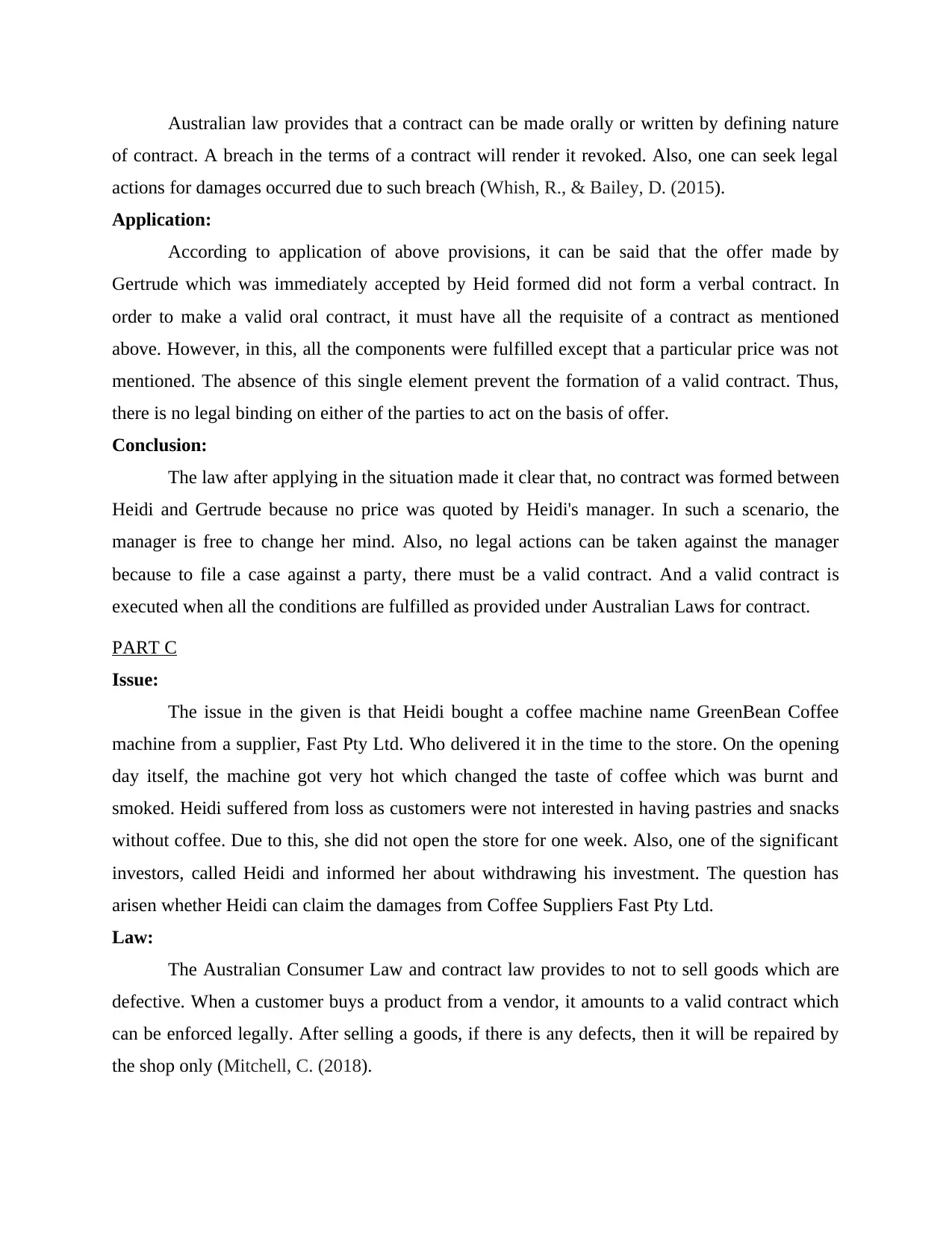
Australian law provides that a contract can be made orally or written by defining nature
of contract. A breach in the terms of a contract will render it revoked. Also, one can seek legal
actions for damages occurred due to such breach (Whish, R., & Bailey, D. (2015).
Application:
According to application of above provisions, it can be said that the offer made by
Gertrude which was immediately accepted by Heid formed did not form a verbal contract. In
order to make a valid oral contract, it must have all the requisite of a contract as mentioned
above. However, in this, all the components were fulfilled except that a particular price was not
mentioned. The absence of this single element prevent the formation of a valid contract. Thus,
there is no legal binding on either of the parties to act on the basis of offer.
Conclusion:
The law after applying in the situation made it clear that, no contract was formed between
Heidi and Gertrude because no price was quoted by Heidi's manager. In such a scenario, the
manager is free to change her mind. Also, no legal actions can be taken against the manager
because to file a case against a party, there must be a valid contract. And a valid contract is
executed when all the conditions are fulfilled as provided under Australian Laws for contract.
PART C
Issue:
The issue in the given is that Heidi bought a coffee machine name GreenBean Coffee
machine from a supplier, Fast Pty Ltd. Who delivered it in the time to the store. On the opening
day itself, the machine got very hot which changed the taste of coffee which was burnt and
smoked. Heidi suffered from loss as customers were not interested in having pastries and snacks
without coffee. Due to this, she did not open the store for one week. Also, one of the significant
investors, called Heidi and informed her about withdrawing his investment. The question has
arisen whether Heidi can claim the damages from Coffee Suppliers Fast Pty Ltd.
Law:
The Australian Consumer Law and contract law provides to not to sell goods which are
defective. When a customer buys a product from a vendor, it amounts to a valid contract which
can be enforced legally. After selling a goods, if there is any defects, then it will be repaired by
the shop only (Mitchell, C. (2018).
of contract. A breach in the terms of a contract will render it revoked. Also, one can seek legal
actions for damages occurred due to such breach (Whish, R., & Bailey, D. (2015).
Application:
According to application of above provisions, it can be said that the offer made by
Gertrude which was immediately accepted by Heid formed did not form a verbal contract. In
order to make a valid oral contract, it must have all the requisite of a contract as mentioned
above. However, in this, all the components were fulfilled except that a particular price was not
mentioned. The absence of this single element prevent the formation of a valid contract. Thus,
there is no legal binding on either of the parties to act on the basis of offer.
Conclusion:
The law after applying in the situation made it clear that, no contract was formed between
Heidi and Gertrude because no price was quoted by Heidi's manager. In such a scenario, the
manager is free to change her mind. Also, no legal actions can be taken against the manager
because to file a case against a party, there must be a valid contract. And a valid contract is
executed when all the conditions are fulfilled as provided under Australian Laws for contract.
PART C
Issue:
The issue in the given is that Heidi bought a coffee machine name GreenBean Coffee
machine from a supplier, Fast Pty Ltd. Who delivered it in the time to the store. On the opening
day itself, the machine got very hot which changed the taste of coffee which was burnt and
smoked. Heidi suffered from loss as customers were not interested in having pastries and snacks
without coffee. Due to this, she did not open the store for one week. Also, one of the significant
investors, called Heidi and informed her about withdrawing his investment. The question has
arisen whether Heidi can claim the damages from Coffee Suppliers Fast Pty Ltd.
Law:
The Australian Consumer Law and contract law provides to not to sell goods which are
defective. When a customer buys a product from a vendor, it amounts to a valid contract which
can be enforced legally. After selling a goods, if there is any defects, then it will be repaired by
the shop only (Mitchell, C. (2018).
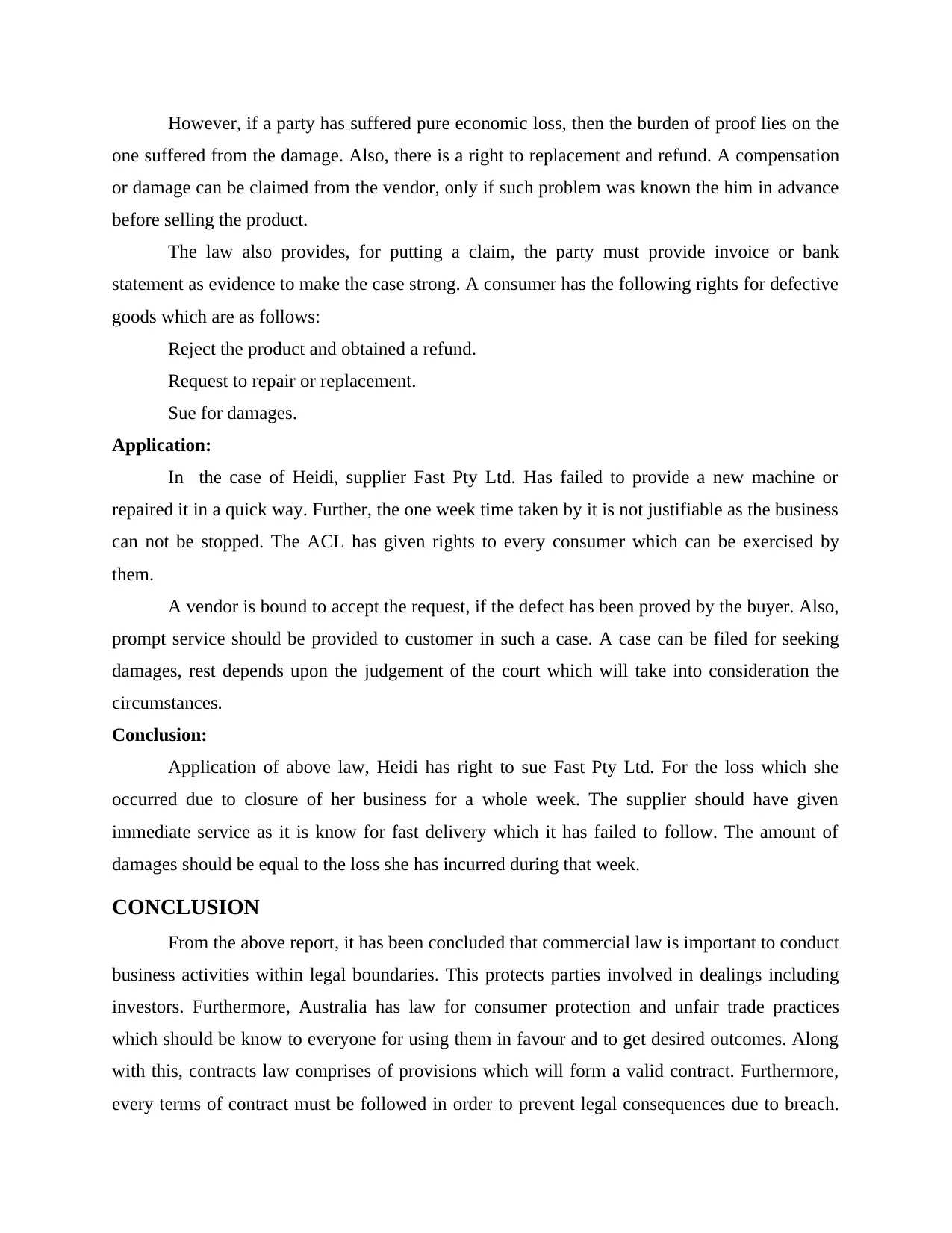
However, if a party has suffered pure economic loss, then the burden of proof lies on the
one suffered from the damage. Also, there is a right to replacement and refund. A compensation
or damage can be claimed from the vendor, only if such problem was known the him in advance
before selling the product.
The law also provides, for putting a claim, the party must provide invoice or bank
statement as evidence to make the case strong. A consumer has the following rights for defective
goods which are as follows:
Reject the product and obtained a refund.
Request to repair or replacement.
Sue for damages.
Application:
In the case of Heidi, supplier Fast Pty Ltd. Has failed to provide a new machine or
repaired it in a quick way. Further, the one week time taken by it is not justifiable as the business
can not be stopped. The ACL has given rights to every consumer which can be exercised by
them.
A vendor is bound to accept the request, if the defect has been proved by the buyer. Also,
prompt service should be provided to customer in such a case. A case can be filed for seeking
damages, rest depends upon the judgement of the court which will take into consideration the
circumstances.
Conclusion:
Application of above law, Heidi has right to sue Fast Pty Ltd. For the loss which she
occurred due to closure of her business for a whole week. The supplier should have given
immediate service as it is know for fast delivery which it has failed to follow. The amount of
damages should be equal to the loss she has incurred during that week.
CONCLUSION
From the above report, it has been concluded that commercial law is important to conduct
business activities within legal boundaries. This protects parties involved in dealings including
investors. Furthermore, Australia has law for consumer protection and unfair trade practices
which should be know to everyone for using them in favour and to get desired outcomes. Along
with this, contracts law comprises of provisions which will form a valid contract. Furthermore,
every terms of contract must be followed in order to prevent legal consequences due to breach.
one suffered from the damage. Also, there is a right to replacement and refund. A compensation
or damage can be claimed from the vendor, only if such problem was known the him in advance
before selling the product.
The law also provides, for putting a claim, the party must provide invoice or bank
statement as evidence to make the case strong. A consumer has the following rights for defective
goods which are as follows:
Reject the product and obtained a refund.
Request to repair or replacement.
Sue for damages.
Application:
In the case of Heidi, supplier Fast Pty Ltd. Has failed to provide a new machine or
repaired it in a quick way. Further, the one week time taken by it is not justifiable as the business
can not be stopped. The ACL has given rights to every consumer which can be exercised by
them.
A vendor is bound to accept the request, if the defect has been proved by the buyer. Also,
prompt service should be provided to customer in such a case. A case can be filed for seeking
damages, rest depends upon the judgement of the court which will take into consideration the
circumstances.
Conclusion:
Application of above law, Heidi has right to sue Fast Pty Ltd. For the loss which she
occurred due to closure of her business for a whole week. The supplier should have given
immediate service as it is know for fast delivery which it has failed to follow. The amount of
damages should be equal to the loss she has incurred during that week.
CONCLUSION
From the above report, it has been concluded that commercial law is important to conduct
business activities within legal boundaries. This protects parties involved in dealings including
investors. Furthermore, Australia has law for consumer protection and unfair trade practices
which should be know to everyone for using them in favour and to get desired outcomes. Along
with this, contracts law comprises of provisions which will form a valid contract. Furthermore,
every terms of contract must be followed in order to prevent legal consequences due to breach.
Paraphrase This Document
Need a fresh take? Get an instant paraphrase of this document with our AI Paraphraser

Furthermore, written and oral contracts hold same value in the eyes of law and can be enforced
under law.
under law.
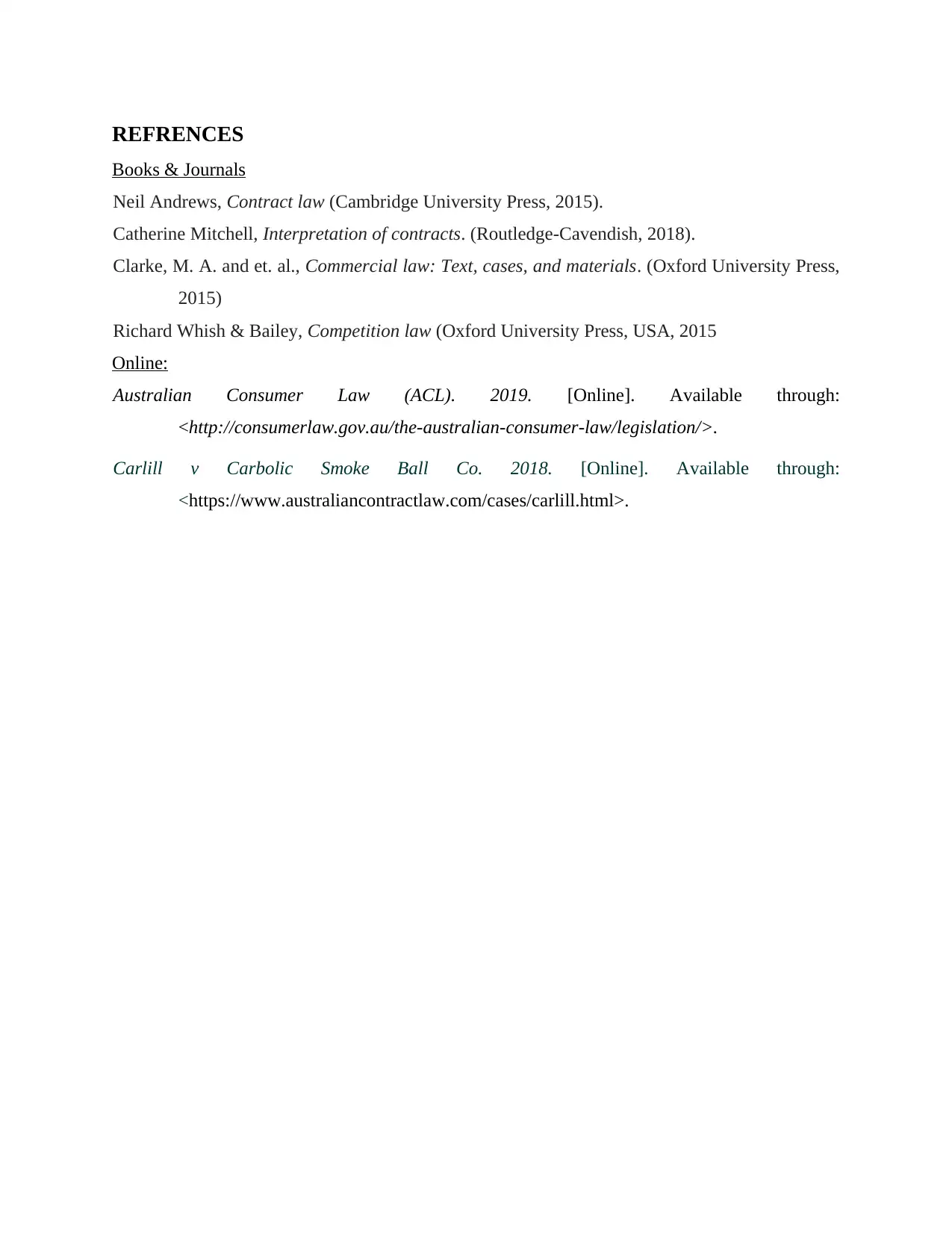
REFRENCES
Books & Journals
Neil Andrews, Contract law (Cambridge University Press, 2015).
Catherine Mitchell, Interpretation of contracts. (Routledge-Cavendish, 2018).
Clarke, M. A. and et. al., Commercial law: Text, cases, and materials. (Oxford University Press,
2015)
Richard Whish & Bailey, Competition law (Oxford University Press, USA, 2015
Online:
Australian Consumer Law (ACL). 2019. [Online]. Available through:
<http://consumerlaw.gov.au/the-australian-consumer-law/legislation/>.
Carlill v Carbolic Smoke Ball Co. 2018. [Online]. Available through:
<https://www.australiancontractlaw.com/cases/carlill.html>.
Books & Journals
Neil Andrews, Contract law (Cambridge University Press, 2015).
Catherine Mitchell, Interpretation of contracts. (Routledge-Cavendish, 2018).
Clarke, M. A. and et. al., Commercial law: Text, cases, and materials. (Oxford University Press,
2015)
Richard Whish & Bailey, Competition law (Oxford University Press, USA, 2015
Online:
Australian Consumer Law (ACL). 2019. [Online]. Available through:
<http://consumerlaw.gov.au/the-australian-consumer-law/legislation/>.
Carlill v Carbolic Smoke Ball Co. 2018. [Online]. Available through:
<https://www.australiancontractlaw.com/cases/carlill.html>.
1 out of 9
Your All-in-One AI-Powered Toolkit for Academic Success.
+13062052269
info@desklib.com
Available 24*7 on WhatsApp / Email
![[object Object]](/_next/static/media/star-bottom.7253800d.svg)
Unlock your academic potential
© 2024 | Zucol Services PVT LTD | All rights reserved.





